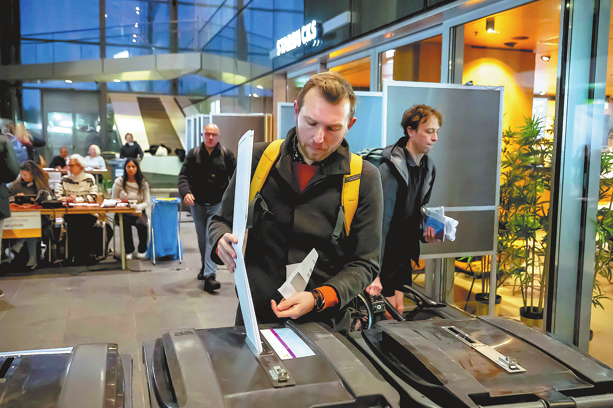US stocks dive anew on fear of coronavirus


US stocks plunged Thursday as the worldwide spread of the coronavirus continued to infect a seesaw market with what it fears most: uncertainty.
Most analysts foresee an economic downdraft in the first half of the year followed by recovery in the final six months. But it's impossible to know how quickly the coronavirus will spread or how severely it will disrupt supply chains, production, travel, employment or consumer spending.
Investors placed their bets Thursday by dumping airline and leisure stocks while seeking safety in bonds and gold.
Oil prices, a proxy for future economic activity, moved lower. OPEC agreed to cut production by an additional 1.5 million barrels per day in the second quarter to support prices.
The Dow Jones Industrial Average dropped 959.58 points, or 3.58 percent, and closed at 26,121.58. The S&P 500 declined 106.18 points, or 3.39 percent, and finished at 3023.94. The Nasdaq Composite index lost 279.49 points, or 3.10 percent, and closed at 8738.60.
The Dow has swung wildly for the last two weeks amid concern about worldwide economic disruption caused by the coronavirus, which the World Health Organization (WHO) said has infected 80,442 people worldwide and killed 2,984.
The blue-chip index was down consistently the week of Feb 24, dropping 1,032 points on Monday, 879 points on Tuesday, 124 points of Wednesday, 1,191 points on Thursday and 357 points on Friday.
The market gyrated wildly this week, climbing 1,294 points on Monday, falling 786 points on Tuesday and rallying 1,173 points on Wednesday.
Wild swings are likely to continue. The Chicago Board Options Exchange Volatility Index, often called Wall Street's fear gauge, was at 41.25 in midday trading Thursday, its highest level since 2011, when ratings agencies downgraded US government debt.
The index, known as the VIX, represents the market's expectation of 30-day forward-looking volatility. It's derived from the prices of the S&P 500 index options and provides a measure of investor sentiment.
The immediate economic outlook appears bleak.
Goldman Sachs foresees supply-chain disruptions and lower economic activity, leading to a "short-lived global contraction that stops short of an outright recession".
The International Air Transport Association (IATA), a Montreal-based trade group, said it expects the coronavirus to reduce airline passenger revenue $63 billion to $113 billion this year, up from its original estimate of $29.3 billion.
The trade group expects revenue in Asia, including China, Japan and South Korea, to drop 23 percent, or $49.7 billion. In Canada and the US, IATA forecasts a 10 percent drop, or $21.1 billion.
On Thursday, investors pounded airline and leisure stocks amid virus fears. American Airlines fell 13.44 percent, United Airlines dropped 13.25 percent and Delta skidded 7.20 percent. Cruise-ship operator Carnival slid 14.17 percent and Royal Caribbean Cruises lost 16.29 percent.
The Institute of International Finance (IIF), a Washington-based association with about 450 members in 70 countries, lowered its 2020 forecast for US growth to 1.3 percent, down from 2 percent.
Worldwide, the group expects growth to slow to 1.3 percent, down from its initial forecast of 2 percent. That would be below the 2.6 percent expansion in 2019, and the weakest since the 2008 financial crisis.
"The range of potential outcomes is large and depends on the spread of the virus and resulting economic fallout, all of which are highly uncertain at this stage," the IIF said in a report.
The Organization for Economic Cooperation and Development said the coronavirus "presents the global economy with its greatest danger since the financial crisis".
"Even in the best-case scenario of limited outbreaks in countries outside China, a sharp slowdown in world growth is expected in the first half of 2020 as supply chains and commodities are hit, tourism drops and confidence falters," the Paris-based group said in a report.

































